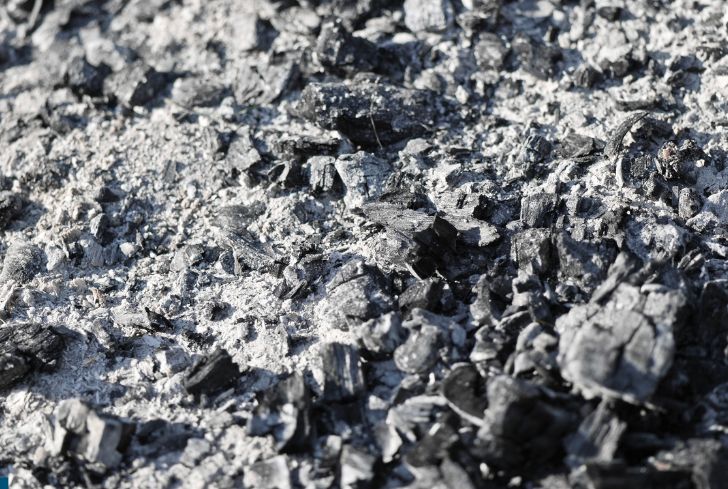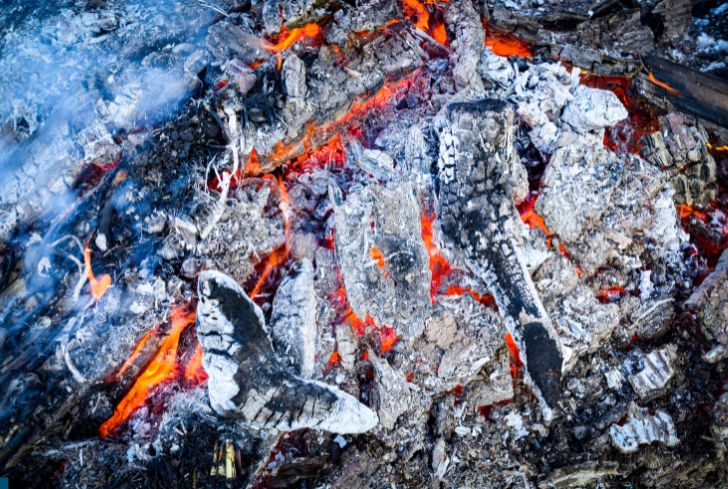As a gardener, you might want to understand a few tips and tricks to help you improve soil fertility and boost plant growth in your garden. But from all the available tips, this post will precisely look at the benefits of using wood ash to kill moss and weeds.
Wood ash is a powdery residue left after the combustion of firewood. This composite has many uses in the garden, including boosting soil PH value. Furthermore, the calcium macronutrients in the ash help to strengthen the cell walls of plants and reduce the risk of certain calcium-deficiency disorders like stunted growth in celery, tipburn in lettuce, and blossom end rot in tomatoes & pepper.
But, does wood ash have other benefits than improving the soil’s PH value? Well, this article will look at wood ash as an alternative to killing moss and weeds in the garden.
But remember that the source of wood ash is an essential factor you should always consider.
Does Wood Ash Get Rid of Moss or Weeds?
Yes! Wood ash eliminates moss and a few other weeds like the Japanese knotweed, spear thistle, and kudzu. Also, apply wood ash correctly for effective results. Where you get the ash should also be a factor to consider.
Remember that moss has its benefits like absorbing harmful toxins in the water with its water-absorbing nature and reducing soil erosion, it can be harmful if unmanaged.
Moss thrives better in soils with a PH level of 5-5.5. So, adding wood ash to the soil will increase the alkalinity of the soil. Thus, affecting moss growth.
Weeds, on the other hand, are any unwanted/undesirable flowering or nonflowering plants in the garden. Weeds commonly cause competition for nutrients with your cultivated garden plants. But note that weeds have advantages and disadvantages.
Number one, weeds are a habitat for many insects and microorganisms that help pollination. Two, weeds will stabilize nutrients in the soil and improve the soil quality. Lastly, weeds like white clover thrive in nitrogen-deficient soil but transfer nitrogen back into the ground when they break down and replenish the soil.
On the contrary, a few common poisonous garden weeds like ragwort, spear thistle, and horehound will destroy the roots, defoliate garden plants, and stunt your garden plants apart from reducing the amount of moisture in the soil. Hence, never let weeds thrive in your garden.
You can physically uproot the weeds and moss if you have a small garden or if the weeds have not extended immensely. However, using wood ash guarantees successful results. It is among the most effective and natural techniques used compared to the chemical herbicides in the market.
Does Wood Ash Kill Ticks?
Wood ash is a natural tick repellant. Unfortunately, there is a debate as to whether wood ash will kill ticks. Wood ash helps repel pests like fleas and ticks. Though, some farmers claim that wood ash helps kill ticks in livestock hooves.
Ticks thrive better in summer when the temperatures are warm. They lay eggs and habituate in low-lying ground cover. You can spot ticks in moist spots (under dead leaves on the plant bed) and twigs in the garden. Wood ticks cause Lyme disease and Rocky Mountain spotted fever in humans.
Nowadays, most gardeners use chemical products like acaricide to deal with ticks in the garden. But remember that Acaricide is a pesticide that eliminates tick invasion in the garden.
Most of these pesticides we see today can be harmful to the environment. Particularly uncertified pesticides. These pesticides often contaminate soil, water, and vegetation and cause chronic disorders in the human body. Also, some pesticides might kill beneficial insects, birds, fish, and untargeted plants if they consume the chemicals.
Sprinkle enough wood ash in areas around your garden that you suspect are infested with ticks. Also, stir wood ash into the compost pile to boost the compost’s efficiency. If you are not sure where the ticks are, it will be advisable to sprinkle the plant stem and branches.
Is Wood Ash Good For Tomatoes?
Yes, wood ash is good for tomatoes. It is also a naturally available resource at home. Remember that tomatoes are acidic plants and require potassium to thrive well. So, adding wood ash to the top soil boost tomato growth. Apart from wood ash, potash is available in organic matter and fertilizers.
Wood ash also contains calcium nutrients that prevent blossom end rot in tomatoes and increase nutrients in calcium-deficient soil.
Though, you should spread 1 ½ inch wood ash in a 1000 sq. ft. vegetable garden for effective results. The application should, however, be once a year.
Does Wood Ash Kill Poison Ivy?
Yes. Wood ash will kill poison ivy. However, the process is slow because poison ivy is much more tolerant to changes in PH levels in the soil. Furthermore, poison ivy has deeper roots – hence it can be a bit challenging to get the wood ash deep into the ground.
Consequently, you need to apply wood ash regularly in a poison ivy-affected area until it begins to wither.
Does Wood Ash Repel Snakes?
From all its uses at home, this versatile compound does not repel snakes. Technically, there is no proof that wood ash indeed repels snakes. However, wood ash repels cockroaches, ants, and mice. Snakes will be attracted to the garden when there are too many mice. The mice and rodents are a favorite dish for snakes.
Remember that snakes like to crawl on the garden floors to look for rodents like mice hiding under dead leaves. So, even if you sprinkle wood ash to kill moss or weeds, some rodents will still operate in the gardens to look for fruits.
Removing all clutter and blocking access to the garden are two effective techniques for dealing with rodents in the garden. As mentioned above, snakes will not slither in your garden if you deal with rodents effectively.
The only sure way of dealing with snakes in the garden is to use Sulfur powder. Sprinkle enough sulfur powder around your home according to the recommendations. The sulfur will irritate the snake’s skin.

Does Wood Ash Repel Mice?
Yes. Wood ash repels mice when used correctly. If you sprinkle wood ash in the garden, mice will relocate immediately. Mice do not like the smell of wood ash. So, they will stay away from an area spread with wood ash.
Before sprinkling wood ash on the plant’s base, always ensure it is cool. Also, use safety gloves to avoid caustic burns & injuries and a mask to avoid inhaling the ash particles. You can probably leave to cool down for a day or two. Remember that using hot wood ash can burn garden plants or other surfaces (if you sprinkle it indoors).
Apart from repelling mice, wood ash will also deter critters and snails from the garden bed.
How to Spread Wood Ash on the Lawn?
First and foremost, you need to use a soil PH tester to determine the acidity in the soil before spreading wood ash on the lawn. This will help in determining the amount of wood ash to apply. Plants like cauliflower and onions benefit from wood ash, while pine trees and blueberries don’t.
Wood ash can be used as a top dressing or before planting. Also, it should be used a few weeks before winter or early spring (depending on the plants available in the garden).
Here are the steps involved:
- Wear gloves and a dust mask
- Sift the wood ash to remove large charcoal pieces
- Test the soil PH level to know how much wood ash is required. The standard measurement is, however, 15-20 pounds per 1000 sq. ft. You can also measure 2 ounces of ash for every square yard (45-65g per sq. meter)
- Evenly sprinkle enough wood ash on the garden and rake it to ensure the topsoil covers it.
- Retest the soil PH value after a few months to ensure correct alkalinity or acidity levels
Benefits of Using Wood Ash in the Garden
Adding the correct amount of wood ash to the compost manure helps it to maintain its PH level for mulching. Also, wood ash keeps the compost from turning acidic and creates a conducive environment for composting worms. It also speeds up the decomposition process.
Apart from maintaining the acidity in compost manure, wood ash has several other uses in the garden.
Here are two uses of wood ash.
1. Helps to make the soil basic/increase soil PH value: Wood ash contains about 9-11 PH levels (ideal for neutralizing an acidic soil) depending on the parent wood. Note that alkaline soil is essential for lavender, lily of the valley, honeysuckle, and ornamental clovers.
2. Contains all necessary chemical properties plants require: Wood ash contains calcium, magnesium, potassium, manganese, and phosphorous. Using enough wood ash (specifically from hardwood like birch, maple, and oak) in a vegetable garden helps to provide nutrients for plants like garlic, leeks, chives, and lettuce to thrive well.






